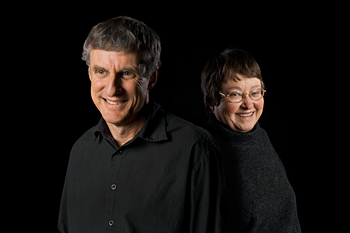January 2010
World-class astronomer and historian to co-teach new course on exploring land, sea and space
Mary Beth Norton, the Mary Donlon Professor of American History, dreamed of the stars as a child. Steven Squyres, the Goldwin Smith Professor of Astronomy, was a history buff, devouring accounts of expeditions around the world. When they met at a reception, Squyres suggested a collaborative class on exploration of land, sea and space -- with the end result that they're now planning on making history, as well as teaching it.

Robert Barker/Matthew Fondeur/University Photography
Steven Squyres, the Goldwin Smith Professor of Astronomy, and Mary Beth Norton, the Mary Donlon Professor of American History, are teaming up this coming fall to co-teach "The History of Exploration: Land, Sea and Space."
According to Norton, this unique course, "The History of Exploration: Land, Sea and Space" (History 1700/Astronomy 1700), planned for fall 2010, could only be taught at a school like Cornell. "You need people in the right areas, and at Cornell we've got a wide variety of experts to draw on," she says. And Cornell's interdisciplinary emphasis makes the course possible.
The course they've developed covers a vast range of human history, from ancient Mediterranean seafarers to the Mars rovers, from Zheng He to James Cook. "Before hearing about this class I would never have reconciled the ancient and modern aspects of exploration in my mind," says Lesley Henderson '11.
In addition to their academic accomplishments, each co-teacher brings additional -- and unusual -- expertise to the class.
A sailor who has traveled on both small boats and tall ships, Norton understands intimately the challenges, both human and technological, of seafaring explorers. She offers a unique perspective on what it meant to sail across the Atlantic in the early modern period.
Squyres has always loved the Arctic and Antarctic, locations that mimic many of the conditions on Mars. He's become something of an expert on arctic expedition logistics and safety issues, including climbing ropes, ice climbing and avoiding polar bears.
The class, says Norton, will address such questions as "what kinds of obstacles do people confront, what technologies have to be developed at each stage, what are the positive and negative consequences of the exploration, what are the explorers' motivations, and what are the conditions that led to this exploration."
Aquillah White '13, an English major, says she expects the class to broaden her studies. "It will help me learn more about places in the world and where I might want to explore."
Motivations for exploration can be highly variable, Squyres points out. "Mars is pure science, but that's not why the Vikings sailed to North America."
"Teaming historians with people who do modern exploration will make it really interesting," Squyres says. Thus, Mars rover fans won't be disappointed: if the rovers are still operational, Squyres will give a brief update at the beginning of each class on the ongoing exploration of the Red Planet.
Guest lecturers include experts on specific historical periods, as well as J.B. Heiser, former director of the Shoals Marine Laboratory. Norton says that the lecturers are so excited about the course that many plan to attend every lecture, not just the ones they're giving. "I think it's going to be a fun course," Squyres says, his face lighting up. "It's taking me outside my comfort zone of science, and I'm really looking forward to it."
Linda Glaser is a freelance writer in Ithaca.